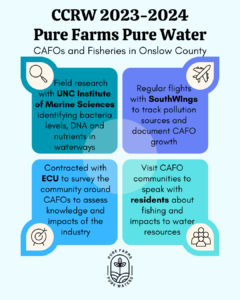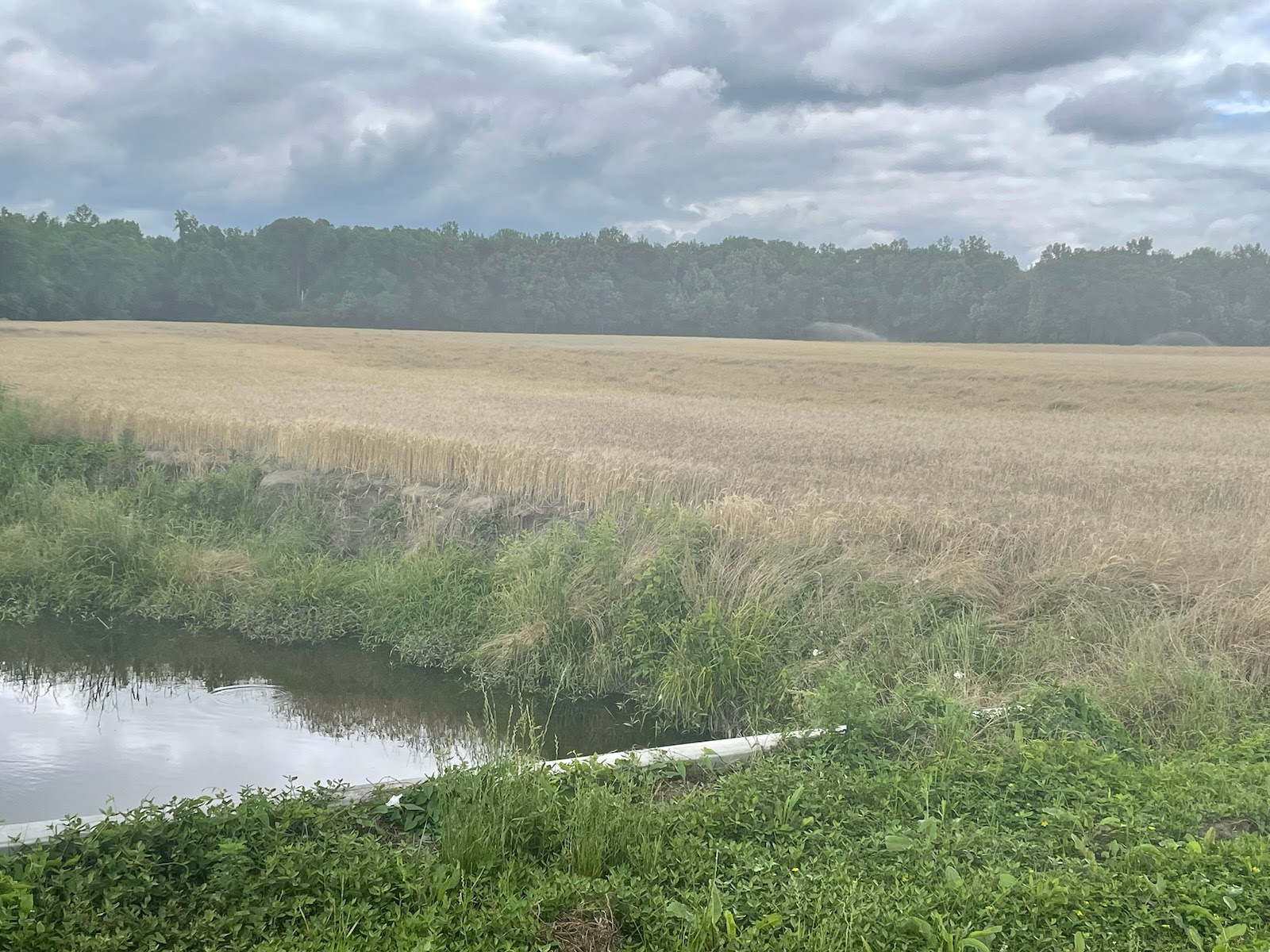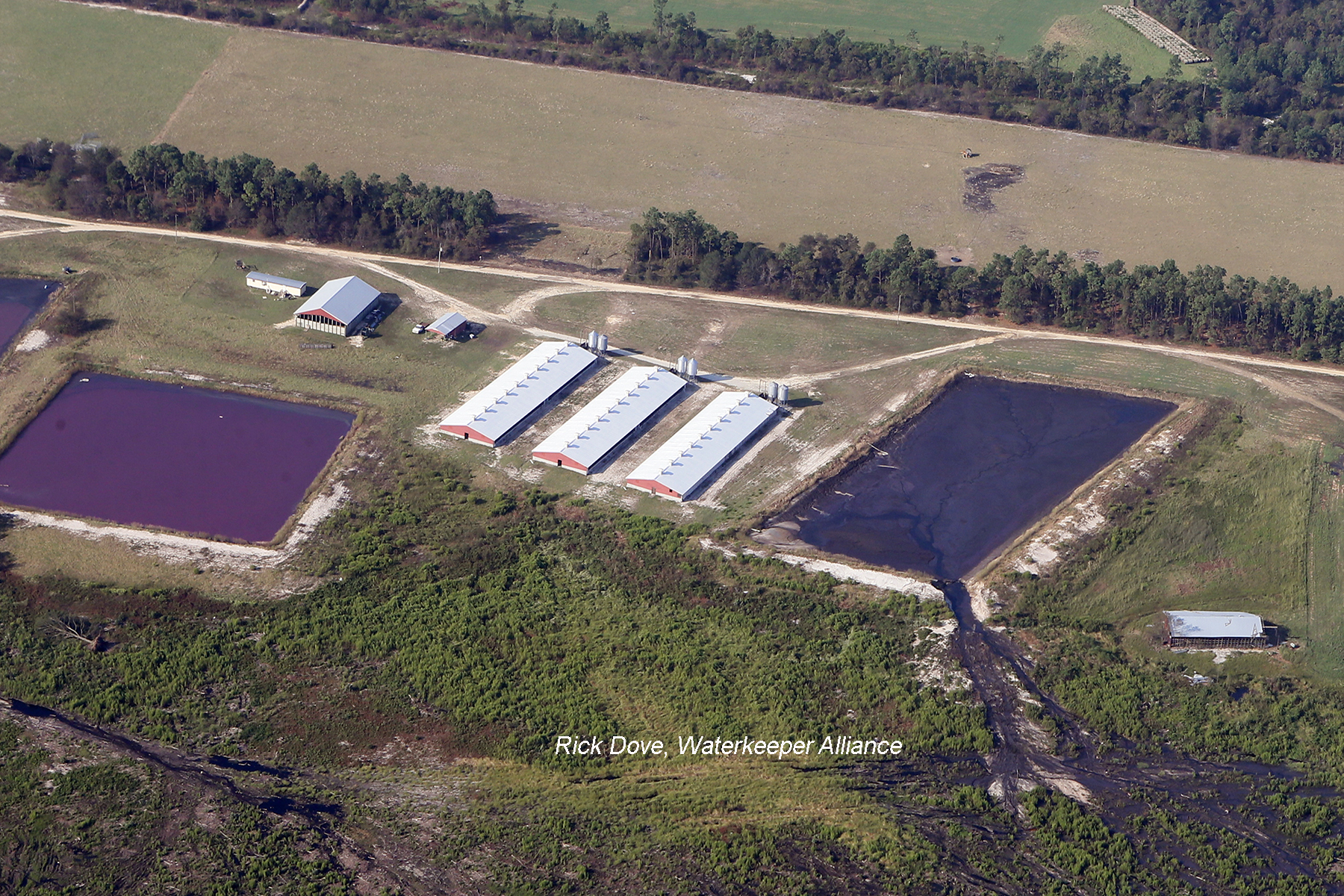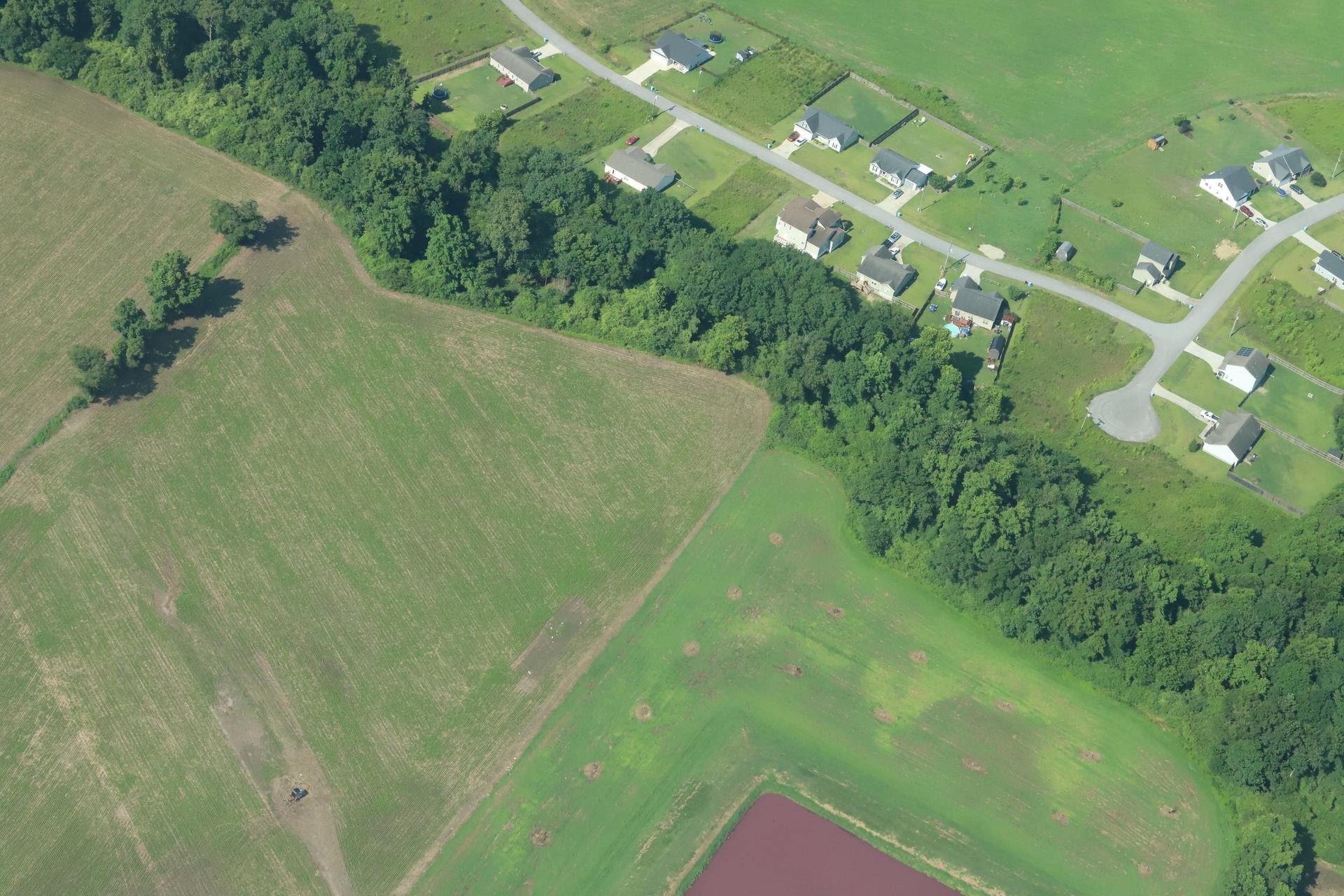
PURE FARMS, PURE WATERS:
New Project Assesses CAFO and Fisheries Connection
Coastal Carolina Riverwatch (CCRW) is excited to announce a new Pure Farms Pure Waters (PFPW) project! Through funding from Waterkeeper Alliance, this project will be in conjunction with our Water Quality for Fisheries (WQ4F) program. The project will assess bacteria levels throughout the New River, use DNA to track the sources of this bacteria pollution, outreach into impacted communities, and report observed Concentrated Animal Feeding Operations (CAFO) violations to the state.
In 2021, the CCRW WQ4F project was developed through collaboration with the coastal commercial and recreational fishing community, water quality researchers, and coastal water quality advocacy organizations as a result of an outcry of concern for water quality impacts that are having a direct impact on marine fisheries and marine ecosystems. Industrial Agriculture and Factory Farming (Concentrated Animal Feeding Operations – CAFOs) are the number one water quality impact to fisheries according to those who fish on the NC coast.
Our goal for this PFPW-WQ4F expansion is to assess the extent of hog waste pollution in impaired waters and waters being used for fishing (recreational, commercial, and subsistence fishing). The New River is downstream of several hog and poultry CAFOs and is an important marine estuary. There are multiple areas downriver of these CAFOs that have experienced recent (August 2022) Harmful Algae Blooms, and this area has been experiencing mass mortality in both commercial and wild harvest shellfish (oysters). Project components include collaborative new research and community engagement initiatives.

Photo: DROHAN, R. A sampling site for this PFPW project that is located adjacent to a field spraying CAFO waste.
RESEARCH



![]()
CCRW is collaborating with experienced and knowledgeable partners to gather the most representative and accurate data that we can. Streams of the New River will be analyzed for bacteria levels to determine the levels of contamination at different points in the river. Accompanying this quantitative bacteria assessment will be bacterial DNA analysis to determine the source of the bacteria. The DNA portion of this research will be in collaboration with Johns Hopkins University’s Center for a Livable Future and use a new method of identifying if the bacteria is coming from hogs, poultry, humans, or other sources.
Our primary partner is Christopher Heaney, Ph.D. with Johns Hopkins Center for a Livable Future. He has an extensive list of research and awards and he is interested in Environmental epidemiology; Occupational and environmental health; Infectious diseases; Water and health; Global climate change; and Community-based participatory research.
In addition to water quality data, CCRW is collaborating with the East Carolina University Center for Survey Research to survey residents of Onslow County that live near CAFOs. The survey will ask about the participant’s interactions with CAFOs, issues they have, awareness of CAFOs, and fishing practices. The results will help CCRW understand the impacts of CAFOs beyond water quality and get direct feedback from community members.
Peter L. Francia, Ph.D. is the Director of the ECU Center for Survey Research in the Thomas Harriot College of Arts and Sciences. He is also the author of numerous books and articles on various topics related to American elections and public opinion. Dr. Francia’s insights on American politics have been included in the press accounts of national media outlets.
To round out the research component of this PFPW project, our White Oak Waterkeeper, Riley, will continue routine flights over Onslow County to track new CAFO development and document any permit violations. This is possible through CCRW’s partnership with SouthWings, which connects conservation partners with a network of volunteer pilots to advocate for the restoration and protection of the ecosystems of the Southeast through flight. The flights will also be watching for HABs and other water quality issues that are visible from the sky. Aerial observations allow Riley to quickly respond to water quality emergencies and keep the public informed.
CCRW’s partnership with Duke Marine Lab, through the lab space sponsored by the Duke Wetland Center and Duke student volunteers, also offers unique collaborative opportunities to share resources, improve efficiencies, and leverage funding to support this project and additional work to protect water quality here in coastal NC.
COMMUNITY ENGAGEMENT
Photo: LEWIS, R. An Onslow County community located next to a CAFO lagoon and sprayfield with a wooded stream separating the two.
As we conduct our research, we want to make sure the coastal community is informed of our work and has the opportunity to share their opinion. A new part of our PFPW project will include door-to-door outreach and seasonal community meetings. This outreach aims to get community members involved in understanding the connection between CAFOs and water quality. CCRW will provide educational materials, answer questions about our work and provide resources for residents who are being impacted by the CAFO industry.
Most of the state’s 2,200 industrial hog operations rely on a primitive system to manage hog waste that involves storing untreated urine and feces in unlined pits and spraying the waste on nearby fields. This system, called the lagoon and sprayfield system, causes devastating water and air pollution; nearby families get sick and die at higher rates than people living farther away. These operations disproportionately cause harm to Black, Latino, Indigenous, and low-wealth rural communities.
One of the unique characteristics of the White Oak River Basin is that many of our CAFOs are adjacent to homes occupied by US military families. As part of our door-to-door outreach, we intend to gain advocacy support from our military family community in efforts that will reduce CAFO pollution and inform service families.
Overall, this PFPW-WQ4F project will be a holistic assessment of the impacts that CAFOs have on water quality, fisheries, and quality of life in coastal NC. We look forward to collaborating with so many distinguished partners and sharing what we learn along the way.


